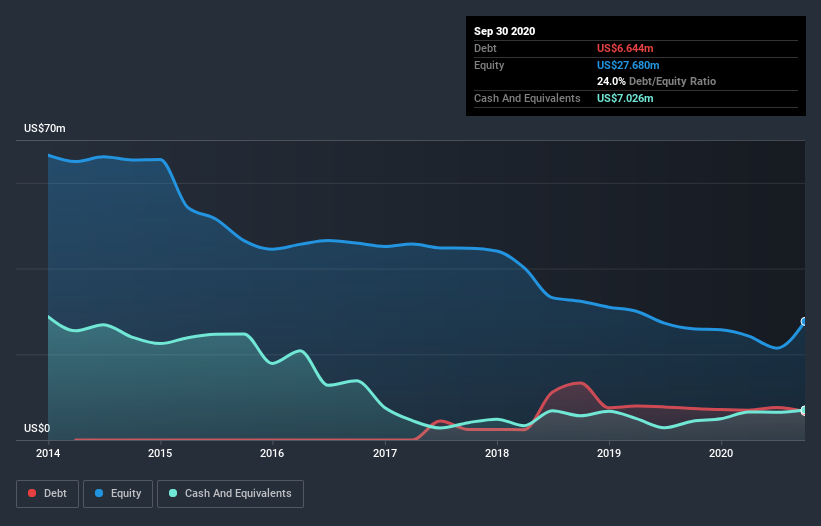- United States
- /
- Entertainment
- /
- NYSEAM:FGH
Health Check: How Prudently Does Ballantyne Strong (NYSEMKT:BTN) Use Debt?

Warren Buffett famously said, 'Volatility is far from synonymous with risk.' So it might be obvious that you need to consider debt, when you think about how risky any given stock is, because too much debt can sink a company. As with many other companies Ballantyne Strong, Inc (NYSEMKT:BTN) makes use of debt. But the more important question is: how much risk is that debt creating?
What Risk Does Debt Bring?
Debt is a tool to help businesses grow, but if a business is incapable of paying off its lenders, then it exists at their mercy. Ultimately, if the company can't fulfill its legal obligations to repay debt, shareholders could walk away with nothing. However, a more common (but still painful) scenario is that it has to raise new equity capital at a low price, thus permanently diluting shareholders. Having said that, the most common situation is where a company manages its debt reasonably well - and to its own advantage. When we examine debt levels, we first consider both cash and debt levels, together.
View our latest analysis for Ballantyne Strong
What Is Ballantyne Strong's Net Debt?
As you can see below, Ballantyne Strong had US$6.64m of debt at September 2020, down from US$7.38m a year prior. However, it does have US$7.03m in cash offsetting this, leading to net cash of US$382.0k.

A Look At Ballantyne Strong's Liabilities
The latest balance sheet data shows that Ballantyne Strong had liabilities of US$17.7m due within a year, and liabilities of US$13.0m falling due after that. Offsetting these obligations, it had cash of US$7.03m as well as receivables valued at US$6.12m due within 12 months. So it has liabilities totalling US$17.6m more than its cash and near-term receivables, combined.
This deficit is considerable relative to its market capitalization of US$28.8m, so it does suggest shareholders should keep an eye on Ballantyne Strong's use of debt. This suggests shareholders would be heavily diluted if the company needed to shore up its balance sheet in a hurry. While it does have liabilities worth noting, Ballantyne Strong also has more cash than debt, so we're pretty confident it can manage its debt safely. When analysing debt levels, the balance sheet is the obvious place to start. But it is Ballantyne Strong's earnings that will influence how the balance sheet holds up in the future. So if you're keen to discover more about its earnings, it might be worth checking out this graph of its long term earnings trend.
Over 12 months, Ballantyne Strong made a loss at the EBIT level, and saw its revenue drop to US$49m, which is a fall of 18%. We would much prefer see growth.
So How Risky Is Ballantyne Strong?
Although Ballantyne Strong had an earnings before interest and tax (EBIT) loss over the last twelve months, it generated positive free cash flow of US$9.1m. So although it is loss-making, it doesn't seem to have too much near-term balance sheet risk, keeping in mind the net cash. With revenue growth uninspiring, we'd really need to see some positive EBIT before mustering much enthusiasm for this business. There's no doubt that we learn most about debt from the balance sheet. However, not all investment risk resides within the balance sheet - far from it. For example, we've discovered 3 warning signs for Ballantyne Strong (1 is significant!) that you should be aware of before investing here.
Of course, if you're the type of investor who prefers buying stocks without the burden of debt, then don't hesitate to discover our exclusive list of net cash growth stocks, today.
If you’re looking to trade Ballantyne Strong, open an account with the lowest-cost* platform trusted by professionals, Interactive Brokers. Their clients from over 200 countries and territories trade stocks, options, futures, forex, bonds and funds worldwide from a single integrated account. Promoted
If you're looking to trade Fundamental Global, open an account with the lowest-cost platform trusted by professionals, Interactive Brokers.
With clients in over 200 countries and territories, and access to 160 markets, IBKR lets you trade stocks, options, futures, forex, bonds and funds from a single integrated account.
Enjoy no hidden fees, no account minimums, and FX conversion rates as low as 0.03%, far better than what most brokers offer.
Sponsored ContentNew: AI Stock Screener & Alerts
Our new AI Stock Screener scans the market every day to uncover opportunities.
• Dividend Powerhouses (3%+ Yield)
• Undervalued Small Caps with Insider Buying
• High growth Tech and AI Companies
Or build your own from over 50 metrics.
This article by Simply Wall St is general in nature. It does not constitute a recommendation to buy or sell any stock, and does not take account of your objectives, or your financial situation. We aim to bring you long-term focused analysis driven by fundamental data. Note that our analysis may not factor in the latest price-sensitive company announcements or qualitative material. Simply Wall St has no position in any stocks mentioned.
*Interactive Brokers Rated Lowest Cost Broker by StockBrokers.com Annual Online Review 2020
Have feedback on this article? Concerned about the content? Get in touch with us directly. Alternatively, email editorial-team@simplywallst.com.
About NYSEAM:FGH
Fundamental Global
Engages in reinsurance, merchant banking, and asset management business.
Mediocre balance sheet and overvalued.
Similar Companies
Market Insights
Community Narratives



